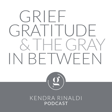
Uncovering the Truth About My Sister's Death -with Ona Gritz
In this heartfelt episode, we chat with Ona Gritz , her new memoir, Everywhere I Look, won the Readers’ Choice Gold Award for Best Adult Book. We talk about her profound grief journey following the tragic loss of her sister, Angie. Ona unravels the mystery and tragedy of Angie’s murder and shares her own awakening to loss, grief, guilt, and the truth.
Ona Gritz holds a Master of Arts in poetry from the creative writing program at New York University. She is the author of August Or Forever, a Reader’s Choice and Wishing Shelf finalist in middle grade fiction. Her nonfiction has appeared in Brevity, The Guardian, The New York Times, River Teeth, The Rumpus, The Utne Reader, and been named Notable in The Best American Essays and Best of the Year in Salon. Her earlier books include On the Whole: A Story of Mothering and Disability and Geode, a finalist for the Main Street Rag Poetry Book Award. She won the Poetry Archive Now Worldview 2020 Competition and has received many other honors for her poems, which have been widely anthologized. Ona lives with her husband, writer Daniel Simpson, near Philadelphia. For more information, please visit her website: https://www.onagritz.com/.
To connect on social media: https://www.instagram.com/onagritz/
Contact Kendra Rinaldi to be a guest on the podcast or to find out more about her offerings:


